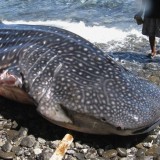I urge everyone to get a copy of the Vancouver Province for July 10 and read, in the A section, pp 8 and 9, a story about shark fins. It’s a tragic story and proves once again that corporations – who have no environmental concerns whatever – will log the last tree, dam the last river, and kill the last fish.
Mentioned prominently is my good friend Anthony Marr. Let me tell you a bit about this unrelenting fighter for animal rights.
Anthony Marr holds a science degree from the UBC and has worked as a field geophysicist and an environmental technologist. In 1995, he became a full time wildlife preservationist, which has brought him to India three times, earning him the title of the “Champion of the Bengal Tiger” in the Champions of the Wild TV series aired in 20 countries. As an anti-hunting activist, he has conducted high profile campaigns in Canada for the bears and seals, and been to Japan twice for the whales and dolphins. He is the founder of Heal Our Planet Earth (HOPE) and is currently on his fourth Compassion for Animals Road Expedition (CARE-4), covering 40 states. He is also the author of Omni-Science.
Before going on, 8 years ago Wendy and I were in Tahiti. We took a trip with half a dozen other tourists, by boat, to a lagoon, to see the “Spinner” dolphins. Our guide was a fish biologist.
When we got to the lagoon we were fortunate enough to see these remarkable creatures come out of the water and, as advertised, do a couple of full twists before hitting the water. It was probably the highlight of a wonderful trip.
Our guide asked us what we thought and we were fulsome in our delight. The guide then said, “Two years ago this pod was at about 100 and it’s now over 135 – good news, huh?”
Even though I smelt a rat, I nodded, with the others, in enthusiastic affirmation.
“Not so,” said our mentor. “The increase comes as a result of the killing of sharks.”
“The dolphins, at night, leave the lagoon, cross the reef to find food. Their only enemy is the shark. The sharks are all but gone because of fishermen catching the sharks, cutting off their fins and throwing them, still alive, back into the water. Because the sharks are gone, the dolphins have expanded in numbers at the expense of the entire ecosystem in this area.” (Quite apart from all else, what sort of person would de-fin a fish then send it back into the ocean? And what sort of person would buy the product?)
As you will see in the story, it is mostly Chinese people who buy them as a status symbol, demonstrating their success in life or, in the case of men, for assistance in achieving an erection. (Yes, I know all meat eaters eat the product of cruelty but here added to that cruelty is extinction of a hugely valuable species in oceans all over the world. In fact there are 49 species of sharks in BC waters and 1000 species world wide.)
Why should we care?
Because our part of the oceans is home to many species which are of critical importance to us, including 6 species of salmon, halibut, black cod, several species of rock fish and crustaceans such as shrimp and crab. These are all part of the ecology of the world’s oceans – as John Donne said, “No man is an island unto itself.”
What to do?
Clearly there must be a ban on fishing for sharks and while we can’t make rules for the world we can impose our own ban and we can support Anthony in his battles.
It is possible to impose and police bans if we have the will to do it. An example:
Many years ago I was putting together a show from New Zealand and as part of it I visited Rainbow Springs, not far from Rotorua. This wonderful attraction had a Kiwi bird which is fully protected by the New Zealand government – the one they had was found wounded, and treated.
I went into the darkened room (Kiwi birds are nocturnal) and was permitted to hold it (whereupon it peed all over me!).
I saw some feathers around and I asked my guide if I could take a few and tie some fishing flies with it just for the fun of it.
My guide quickly informed me that if I was caught with them, whether or not I used them for a fly, I would be subject to a huge fine and perhaps jail. I got the message.
There is so much to do on environmental issues and just the thought can exhaust one. But they must be done and all of us must do our part.
Yes, it’s political and our senior governments have both failed us badly. There’s not much we can do for the next 4-5 years on the national scene but the provincial government has less than two years to run and election issues are starting to appear.
In BC we have a tradition of basing our votes on economic matters. Has it made any difference?
If you look back to 1991 can it really be said that the NDP, in fiscal matters, were worse than the present bunch?
I know it goes against the common mantras from the right but the stats show that the NDP was actually a bit better than the subsequent Liberal government and both faced very similar crises beyond their control – the “Asian ‘flu” for the NDP, the Recession for the Liberals.
My point is not to compare but simply to point out that there is really not that much to choose between them.
We have, however, some very real environmental issues including fish farms and their slaughter of migrating wild salmon, an energy policy that destroys rivers and their ecologies, bankrupting BC Hydro in the bargain, a highways policy that eats up farmland and bird sanctuaries and the serious threat to other species off our shores, including our shellfish.
And there is the huge problem of oil pipelines and tankers in our most dangerous waters.
These sorts of things are happening all over the world such that many species face extinction.
We must act and act promptly. We cannot allow ourselves to weary of the fight because it’s on many fronts. We must demand of political parties not just nice fuzzy words about the environment but specific policies in the areas I’ve mentioned.
Time is short – very short.







